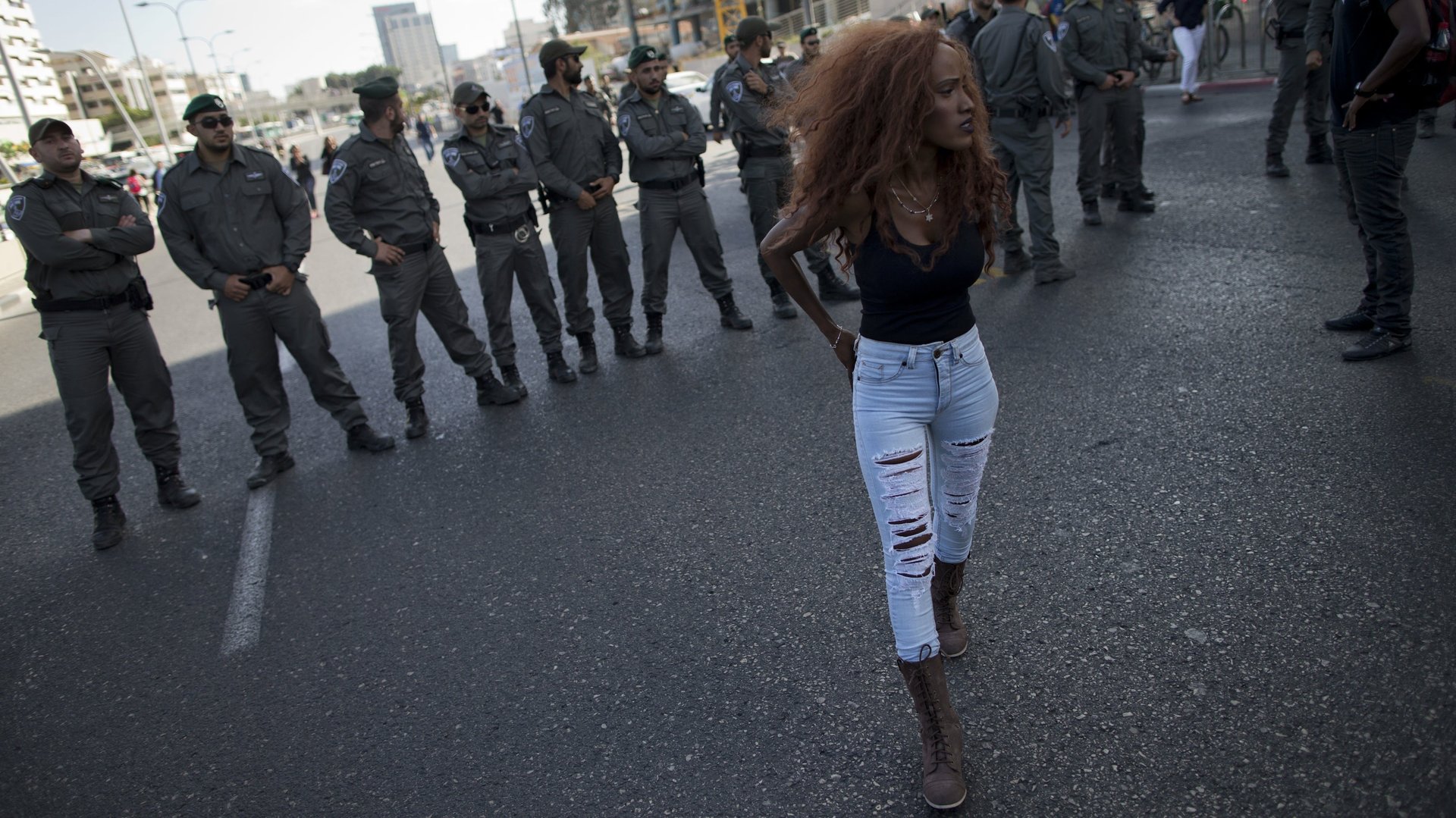Video: Israeli police beating an Ethiopian-Jewish soldier spark a campaign against police brutality
On May 3, thousands of people took to the streets of Tel Aviv to protest police harassment of and brutality targeting Israelis of Ethiopian descent. The march began peacefully, but turned violent after reaching Rabin Square around nightfall.


On May 3, thousands of people took to the streets of Tel Aviv to protest police harassment of and brutality targeting Israelis of Ethiopian descent. The march began peacefully, but turned violent after reaching Rabin Square around nightfall.
Protesters hurled rocks and overturned a police vehicle, The New York Times reported (paywall). Police responded with stun grenades and water cannons. By midnight, “dozens of people were injured,” and police had made 43 arrests, according to Haaretz (paywall).
The protest was sparked by the public release of a video in which a police officer in the Tel Aviv suburb of Holon was recorded beating Damas Pakada, a uniformed soldier of Ethiopian descent, for no apparent reason.
Thus far, the event’s organizers have rejected any comparisons to recent protests in the American city of Baltimore. “The fact that we’re black doesn’t mean that we’re Baltimore,” Inbale Bogale, one of the protest’s leaders, told Haaretz. But the parallels are difficult to look past: As in Baltimore, tensions in Tel Aviv centered on the brutalization of an individual black man by police. The resulting tumult has served as a catalyst to air broader frustrations.
Ethiopian Jews came to Israel in large numbers during the 1970s and ’80s. Many were taking advantage of Israel’s Law of Return, which gives anyone of Jewish descent the right to claim Israeli citizenship. Between 1971 and 1991, Israeli intelligence sought to extract Jews from communist-ruled Ethiopia with assistance from US president Ronald Reagan’s administration. Emigration from Ethiopia hit its peak just before the fall of dictator Mengistu Haile Mariam in 1991.
There are of course arguments to be made that life for Ethiopian Jews is better in Israel than it ever was in Ethiopia (at least under Mengistu’s rule). But the flareup between protesters and Tel Aviv police is indicative of simmering racial tensions. Fifty-two percent of Ethiopian-Israeli families live under the poverty line, according to a report jointly compiled by the Brookdale Institute and Israel’s ministry of immigration. Compare that to 16% for the general Israeli population.
In 2010, only 65% of Ethiopian-Israelis enjoyed regular employment. Those who do secure jobs still face a labor market rife with exploitation. “Ethiopians are an easy catch for manpower agencies,” Julie Wyler, a development officer for Tebeka, an Israeli NGO that provides legal advice for Ethiopians, told humanitarian outlet IRIN News. “They are allowed to hire employees for up to a year without providing social security under Israeli law, so they fire them after 11 months, just to re-employ them again afterwards.”
There are more blatant instances of discrimination, too, according to Tebeka. In 2012, protests erupted after reports surfaced that a group of Israeli landlords had conspired to deny property rentals to Israelis of Ethiopian descent. In 2011, the parents of 281 Ethiopian-Israeli children sued a school in Petah Tikva for denying them enrollment.
Perhaps the most infamous instance of anti-Ethiopian racism was revealed in 2013, however, when the Israeli ministry of health admitted to injecting a number of Ethiopian women with a long-acting birth control drug without informed consent. This is the same government body criticized in 1996 for destroying stocks of blood donated by Ethiopian Israelis out of fear that it might be infected with HIV.
The beating of Damas Pakada was “the last straw” for many Ethiopian Israelis, Inbale Bogale told Haaretz. Not least so because of his military affiliations. “We are the first to volunteer for the elite units in the military,” Dana Sibaho, a 29-year-old bookkeeper from Netivot, told the newspaper. “I personally know many in the community who’ve already fought in three wars. And the state—what it does it tell them to do? Pardon the expression, but it tells them to go stick it you know where.”